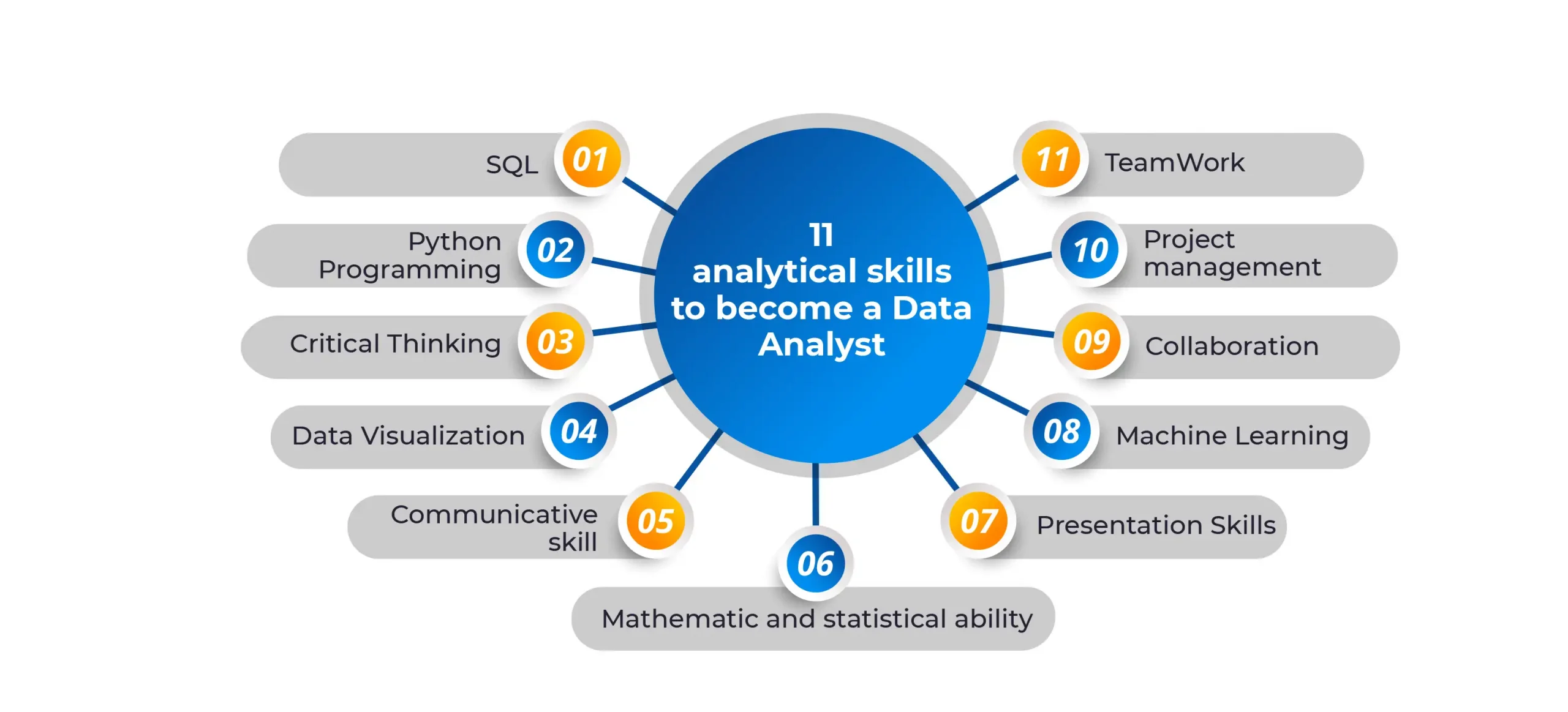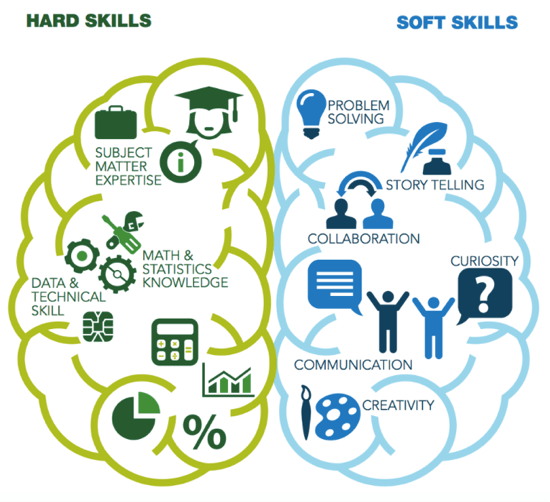
- Introduction to Data Analyst Role in India
- Average Salary of a Data Analyst in India
- Salary Breakdown Based on Experience Level
- Top Industries Hiring Data Analysts in India
- City-Wise Salary Comparison (Bangalore, Mumbai, etc.)
- Top Companies Offering High Salaries for Data Analysts
- Skills That Impact Data Analyst Salaries in India
- Certifications That Increase Salary Potential
- Data Analyst vs Data Scientist Salary in India
- Career Opportunities in AI
- How to Negotiate a Higher Salary in India?
- Future Demand for Data Analysts in India
- Conclusion
Introduction to Data Analyst Role in India
In today’s data-driven world, the role of a Data Analyst is vital for organizations across various sectors. Data analysts collect, process, and interpret large datasets, turning raw data into valuable insights that support informed decision-making. In India, the demand for data analysts has surged, particularly in industries like IT, healthcare, e-commerce, and finance. As businesses increasingly adopt data-driven strategies, the need for professionals who can extract meaningful patterns and trends from data has grown. This shift is further accelerated by the adoption of technologies like artificial intelligence, machine learning, and big data analytics. To meet this rising demand, many aspiring professionals are turning to enroll in our Data Science Training to build the skills necessary for success in this field. Data analysts are no longer just number crunchers; they provide essential insights that influence business strategies and drive innovation. As companies collect and rely on vast amounts of data, having skilled analysts has become crucial to staying competitive. Consequently, the role of data analysts in India is expected to continue to grow, making it an indispensable profession in today’s fast-paced business environment.
Would You Like to Know More About Data Science? Sign Up For Our Data Science Course Training Now!
Average Salary of a Data Analyst in India
The average salary of a Data Analyst in India is influenced by several factors, including experience, location, industry, and skill set. Based on industry reports, the typical annual salary for a data analyst in India falls between ₹4.5 lakh and ₹8 lakh. However, experienced professionals in the field can earn considerably more, with salaries often exceeding this range depending on their expertise, the complexity of the work, and the company they work for. For those exploring career paths, understanding the differences between Data Science vs Computer Science can provide valuable insights into which roles align best with their skills and salary expectations. Skilled data analysts with advanced knowledge in areas such as machine learning, big data analytics, and artificial intelligence are particularly in demand and can command higher salaries. Additionally, location plays a significant role, as analysts in metropolitan cities like Bangalore, Mumbai, and Delhi tend to earn higher salaries compared to those in smaller cities.

Salary Breakdown Based on Experience Level
The salary of a data analyst increases with experience. Here is a general breakdown based on experience:
| Experience Level | Average Salary (per annum) |
|---|---|
| Entry-Level (0-2 years) | ₹3.5 lakh – ₹6 lakh |
| Mid-Level (2-5 years) | ₹6 lakh – ₹12 lakh |
| Senior-Level (5+ years) | ₹12 lakh – ₹20 lakh |
Entry-level data analysts typically earn around ₹4.5 lakh per year, while those with 5+ years of experience can command salaries of ₹12 lakh or more.
Top Industries Hiring Data Analysts in India
Data analysts are in high demand across multiple industries in India. Some of the top industries hiring data analysts include:
- IT and Software – Companies such as TCS, Infosys, and Wipro require data analysts for business intelligence and analytics.
- Finance and Banking – Banks and financial institutions like HDFC, ICICI, and SBI use data analytics for fraud detection and risk assessment.
- E-Commerce – Companies like Amazon, Flipkart, and Myntra rely on data analysts to optimize customer experience and sales.
- Healthcare – Pharmaceutical companies and hospitals use data analytics for medical research and patient care.
- Retail and FMCG – Retail giants like Reliance Retail and Big Bazaar utilize data analytics for customer behavior analysis.
- Telecommunications – Telecom companies use data analysis for network optimization and customer segmentation.
City-Wise Salary Comparison (Bangalore, Mumbai, etc.)
Salaries for data analysts vary significantly depending on location. Here’s a comparison of average salaries in different cities:
| City | Average Salary (per annum) |
|---|---|
Bangalore |
₹7 lakh – ₹15 lakh |
Mumbai |
₹6 lakh – ₹14 lakh |
Delhi |
₹5.5 lakh – ₹12 lakh |
Pune |
₹5 lakh – ₹11 lakh |
Hyderabad |
₹6 lakh – ₹13 lakh |
Chennai |
₹5 lakh – ₹10 lakh |
Bangalore offers the highest salaries due to its status as India’s IT hub, followed by Mumbai and Hyderabad.
Top Companies Offering High Salaries for Data Analysts
Some of the best-paying companies for data analysts in India include:
- Google – ₹12 lakh – ₹25 lakh per annum
- Microsoft – ₹10 lakh – ₹22 lakh per annum
- Amazon – ₹8 lakh – ₹20 lakh per annum
- TCS – ₹6 lakh – ₹15 lakh per annum
- Accenture – ₹6 lakh – ₹14 lakh per annum
- Deloitte – ₹7 lakh – ₹18 lakh per annum
Want to Pursue a Data Science Master’s Degree? Enroll For Data Science Masters Course Today!
Skills That Impact Data Analyst Salaries in India
Certain skills can greatly enhance a data analyst’s earning potential, with some being particularly valued in the industry. SQL, for example, is essential for data retrieval and database management, and having proficiency in it is a must for most data-related roles. Python and R, both powerful programming languages, are widely used for statistical analysis, data manipulation, and data visualization, making them highly sought after by employers. Many professionals looking to build these competencies turn to Data Science Training to gain practical, in-demand skills. Machine learning is another skill that can significantly boost career prospects, as it allows analysts to engage in predictive analytics, a field that is increasingly in demand for its ability to forecast trends and improve decision-making. Data visualization skills are equally important, as tools like Tableau and Power BI enable analysts to create clear and impactful visual reports, making data insights more accessible to non-technical stakeholders. Additionally, knowledge of big data technologies such as Hadoop, Spark, and cloud computing is highly valuable, as organizations increasingly deal with large datasets that require specialized tools and techniques. Finally, expertise in business intelligence (BI) plays a crucial role in strategic decision-making, as BI helps organizations turn data into actionable insights that guide business growth. Analysts with a combination of these skills are often able to command higher salaries, as they bring a broad range of capabilities that allow businesses to leverage data more effectively.
Certifications That Increase Salary Potential
Certifications can enhance a data analyst’s profile and lead to higher salaries. Some of the top certifications include:
- Google Data Analytics Professional Certificate
- Microsoft Certified: Data Analyst Associate
- IBM Data Science Professional Certificate
- Certified Analytics Professional (CAP)
- Tableau Desktop Specialist
- AWS Certified Data Analytics – Specialty
Having one or more of these certifications can improve job prospects and salary potential.

Data Analyst vs Data Scientist Salary in India
Many professionals wonder about the salary differences between a Data Analyst and a Data Scientist. Here’s a quick comparison:
| Role | Average Salary (per annum) |
|---|---|
Data Analyst |
₹4.5 lakh – ₹12 lakh |
Data Scientist |
₹8 lakh – ₹20 lakh |
Data Scientists typically earn more due to their advanced skills in machine learning and deep learning.
Career Growth and Salary Trends in India
The field of data analytics is growing at an impressive pace, offering professionals a wide range of career growth opportunities. Entry-level roles typically begin as Junior Data Analysts, where individuals earn between ₹3.5 lakh and ₹6 lakh per annum. With experience and skill development, professionals move on to the role of a Data Analyst, with salaries ranging from ₹6 lakh to ₹12 lakh annually. As they gain expertise, they can advance to the position of Senior Data Analyst, where salaries typically fall between ₹12 lakh and ₹20 lakh per annum. Beyond that, professionals can pursue higher-level roles such as Data Scientist or Business Intelligence Manager, which offer salaries ranging from ₹15 lakh to ₹30 lakh per annum, depending on the individual’s skills and the company’s size. The progression doesn’t stop there experienced professionals can also transition into more specialized, higher-paying roles like Machine Learning Engineer, Data Engineer, or AI Specialist. These roles come with the potential for even greater salaries, especially as demand for expertise in artificial intelligence, big data technologies, and advanced analytics continues to rise. For those considering long-term prospects in this domain, exploring the Future Scope of Artificial Intelligence can provide valuable insight into where the industry is headed. Overall, the career trajectory in data analytics is promising, with ample opportunities for growth and specialization that can lead to high-paying positions in the industry.
How to Negotiate a Higher Salary in India?
Salary negotiation is crucial for maximizing earnings. Here are some strategies to negotiate a higher salary:
- Research Market Trends – Understand the average salary for your role in your industry and location.
- Highlight Key Skills – Showcase expertise in SQL, Python, and data visualization.
- Leverage Certifications – Use relevant certifications to demonstrate credibility.
- Showcase Past Achievements – Provide concrete examples of how your work impacted business decisions.
- Be Prepared to Walk Away – If the offer is below market value, consider alternative opportunities.
Future Demand for Data Analysts in India
The demand for data analysts in India is expected to grow exponentially due to the increasing reliance on data-driven decision-making across various industries. One key trend driving this demand is the adoption of Artificial Intelligence (AI) and Machine Learning (ML), as more companies integrate these technologies into their operations, creating a heightened need for skilled data analysts who can interpret and manage the data. Another major factor is the growth of cloud computing, with the rise of cloud-based analytics tools expanding the scope of data-related roles and creating more job opportunities. The expansion of e-commerce and fintech is also contributing to this surge, as these industries require data analysts to manage customer insights, optimize operations, and assess risks. Additionally, government initiatives such as Digital India and smart city projects are further fueling the demand for data professionals, as they aim to create a more data-driven infrastructure and governance system. For those exploring roles in the field, understanding the distinction between Data Mining vs Data Science can help clarify career paths and skill requirements. Industry experts predict that by 2025, there will be a 30% increase in demand for data analysts in India, positioning the profession as a lucrative and promising career choice in the years ahead. As businesses continue to embrace data-centric strategies, data analysts will play a central role in driving growth and innovation.
Conclusion
The role of a Data Analyst in India is highly rewarding, offering significant job satisfaction and attractive salary potential. As more businesses across various industries and cities increasingly rely on data-driven strategies, the demand for skilled data analysts continues to rise. Many professionals are now turning to Data Science Training to gain the expertise and certifications needed to thrive in this competitive field. Those with strong analytical skills, relevant credentials, and effective negotiation strategies can secure high-paying roles and advance rapidly in their careers. Industries like IT, healthcare, finance, e-commerce, and more are actively seeking data analysts to help them make informed decisions and optimize operations. Moreover, as companies continue to collect and analyze vast amounts of data, the need for skilled professionals to interpret that data will only grow, leading to greater career opportunities. The future of data analytics in India looks promising, with a continuously evolving field that offers ample room for growth and specialization. As businesses adapt to new technologies like artificial intelligence, machine learning, and big data analytics, the role of the data analyst will become even more central in shaping business strategies and driving innovation. Thus, for those who are ready to build expertise and stay ahead of industry trends, a career in data analytics in India presents immense potential for both professional fulfillment and financial rewards.




